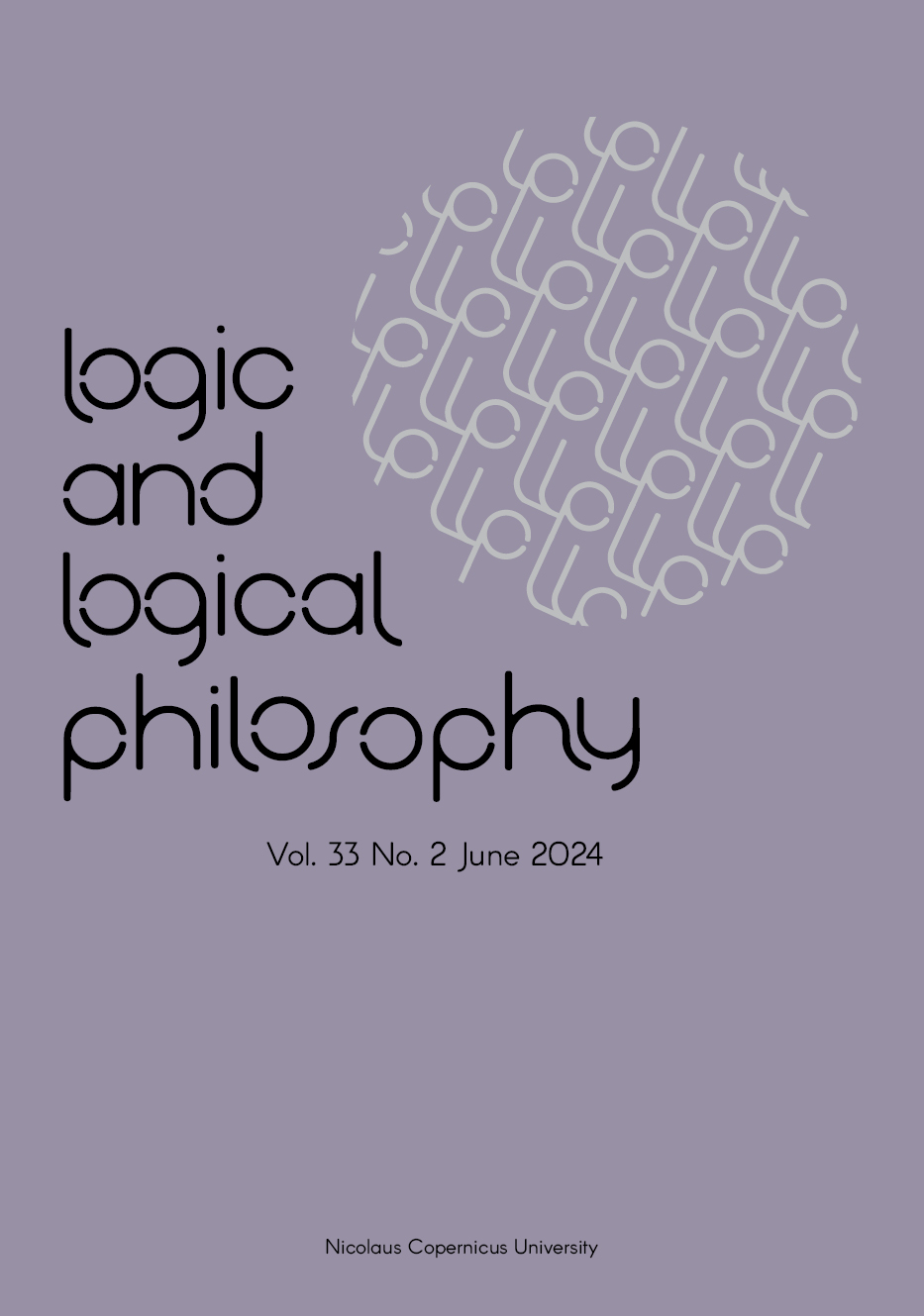ZF-Class Nominalism and the Küng-Armstrong Trilemma
A Plea for Moderate Ineffabilism
DOI:
https://doi.org/10.12775/LLP.2024.005Keywords
class nominalism, ineffabilism, properties, set theoryAbstract
This paper will examine the Küng-Armstrong trilemma against Class Nominalism. We will see that combining Class Nominalism and Zermelo-Fraenkel set theory (ZF) can provide us with a sophisticated version of Class Nominalism, namely ZF-Class Nominalism, which successfully addresses the objection and leads to a moderate version of ineffabilism about the putative set-membership relation.
References
Armstrong, D. M, (1978a), Nominalism and Realism, Vol. 1 of Universals and Scientific Realism, Cambridge University Press, Cambridge.
Armstrong, D. M., (1978b), A Theory of Universals, Vol. 2 of Universals and Scientific Realism, Cambridge University Press, Cambridge.
Armstrong, D. M., (1989), Universals: An Opinionated Introduction, Westview Press, Boulder. DOI: http://dx.doi.org/10.4324/9780429492617
Bernays, P., (1937), “A system of axiomatic set theory–part I”, The Journal of Symbolic Logic 2 (1): 65–77. DOI: http://dx.doi.org/10.1017/s0022481200040135
Blumson, B., (2019), “Naturalness and convex class nominalism”, Dialectica 73 (1-2): 65–81. DOI: http://dx.doi.org/10.1111/1746-8361.12263
Busse, R., (2016), “Class nominalism, wolterstorff’s objection, and combinatorial worlds”, Philosophical Quarterly 66 (265): 680–700. DOI: http://dx.doi.org/10.1093/pq/pqw016
Calemi, F. F., (2014), “The nominalist’s gambit and the structure of predication”, Metaphysica 15 (2): 313–327. DOI: http://dx.doi.org/10.1515/mp-2014-0019
Calemi, F. F., (2016), “Ostrich nominalism or ostrich platonism?”, pages 31–50 in F. F. Calemi (ed.), Metaphysics and Scientific Realism: Essays in Honour of David Malet Armstrong, De Gruyter, Boston/Berlin. DOI: http://dx.doi.org/10.1515/9783110455915-003
Enderton, H., (1977), Elements of Set Theory, Academic Press, New York. DOI: http://dx.doi.org/10.1016/C2009-0-22079-4
Frege, G., (1952), “On concept and object”, pages 42–55 in P. Geach and M. Black (eds.), Translations of the Philosophical Writings of Gottlob Frege, Blackwell, Oxford.
Gärdenfors, P., (2000), Conceptual Spaces: The Geometry of Thought, MIT Press, Cambridge, Mass. DOI: http://dx.doi.org/10.7551/mitpress/2076.001.0001
Garrett, B., (2003), What is This Thing Called Metaphysics?, N.Y.: Routledge. DOI: http://dx.doi.org/10.4324/9780203826232
Guigon, G., and G. Rodriguez-Pereyra, (2015), Nominalism About Properties: New Essays, New York, NY: Routledge. DOI: http://dx.doi.org/10.4324/9781315724874
Hofweber, T., (2016), Ontology and the Ambitions of Metaphysics, Ox ford, England: Oxford University Press UK. DOI: http://dx.doi.org/10.1093/acprof:oso/9780198769835.001.0001
Jech, T., (2002), Set Theory, Springer, Berlin. DOI: http://dx.doi.org/10.1007/3-540-44761-X
Jonas, S., (2016), Ineffability and its Metaphysics: The Unspeakable in Art, Religion, and Philosophy, New York, NY: Palgrave-Macmillan. DOI: http://dx.doi.org/10.1057/9781137579553
Kant, I., (1781), Critique of Pure Reason, St. Martins, New York.
Küng, G., (1967), Ontology and the Logistic Analysis of Language: An Enquiry into the Contemporary Views on Universals, Reidel, Dordrecht. DOI: http://dx.doi.org/10.1007/978-94-010-3514-9
Lewis, D., (1983), “New work for a theory of universals”, Australasian Journal of Philosophy 61: 343–377. DOI: http://dx.doi.org/10.1080/00048408312341131
Lewis, D., (1991), Parts of Classes, Blackwell, Oxford.
Mostowski, A., (1979), “Some impredicative definitions in the axiomatic settheory”, pages 479–492 in A. Mostowski (ed.), Foundational Studies Selected Works, Vol. 93 of Studies in Logic and the Foundations of Mathematics, Elsevier. DOI: http://dx.doi.org/10.1016/S0049-237X(09)70465-3
Potter, M., (2004), Set Theory and its Philosophy: A Critical Introduction, Oxford, England: Oxford University Press.
Priest, G., (2023), “On transcending the limits of language”, in J. Pier (ed.), Limits of Intelligibility: Issues from Kant and Wittgenstein, Routledge. DOI: http://dx.doi.org/10.4324/9781003142133
Quine, W. V. O., (1948), “On what there is”, Review of Metaphysics 2: 21–38. DOI: http://dx.doi.org/10.2307/j.ctv1c5cx5c.6
Quine, W. V. O., (1966), The Ways of Paradox, Random House, New York.
Schiffer, S., (1996), “Language-created, language-independent entities”, Philosophical Topics 24: 149–67. DOI: http://dx.doi.org/10.5840/philtopics199624117
Schnieder, B., (2006), “Attributing properties”, American Philosophical Quarterly 43 (4): 315–328.
Wittgenstein, L., (1961), Tractatus Logico-Philosophicus, Routledge & Kegan Paul, London. Translation by D. F. Pears and B. F. McGuinness; first published in 1921.
Wolterstorff, N., (1970), On Universals an Essay in Ontology, Chicago and London: University of Chicago Press.
Downloads
Published
How to Cite
Issue
Section
License
Copyright (c) 2024 Francesco Calemi

This work is licensed under a Creative Commons Attribution-NoDerivatives 4.0 International License.
Stats
Number of views and downloads: 771
Number of citations: 0







